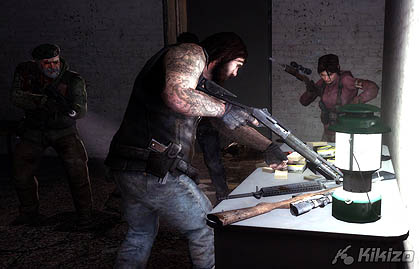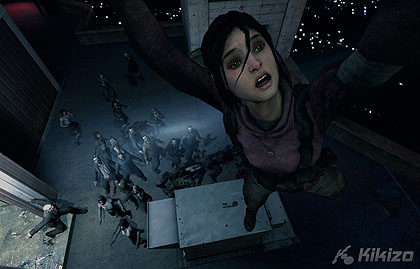Interview: Valve's Doug Lombardi
Always a pleasure to meet with, Doug Lombardi - owner of The Best Laugh in Gaming - speaks with us about Left 4 Dead and Half-Life 2: Episode Three. [Ep2 spoiler removed!]
Page 2
Kikizo: Well, who would turn down the chance to be part of Valve, right?
Lombardi: Well he did, originally! [laughs] He got his cake and got to eat it too. So for him, the cake was not a lie!
Kikizo: [laughs] That is funny Doug. That brings me to the sense of humour in Left 4 Dead. I mean, in other zombie games you might associate with survival horror, you don't really see that... at least, it's not intentional humour!
Lombardi: [laughs] Yeah, we've done that!
Kikizo: But it's like, how can you have a zombie thing without humour of some kind? Look at all the zombie movies. Zombies are funny.
Lombardi: Yeah. Well I mean, there are also ones like 28 Days which is intentionally serious; I mean, the first one was really good. But for us, we look at a lot of the other classic zombie fiction, whether it's games or comic books or movies, and there's always been this nice balance; they scare you and then they make you laugh and they don't take themselves too seriously. And I think that [is important] in any game... Half-Life 1 had some great moments in it, even though it was really scary and had some good gameplay and all that kind of stuff... there's that moment where you're going to hit the elevator and the two scientists go shooting down and scream - you know, that was funny! It's just good to have some comic relief in the game, just like it's good to have some quiet points that complement the big combat moments.
Kikizo: Is there any way you'd be able to get like a PC-like frame rate performance on the Xbox 360 in this release, as this wasn't achieved in Orange Box?
Lombardi: You know, I think once you get up to about 30 frames per second it's darn playable, and the average person doesn't notice it, and I think that's something we as an industry get caught up in, like, "it must be 60 frames per second". I'm sorry but most people can't tell the difference between 30 and 60. You can clearly tell the difference between 20 and 30 though, and that's unacceptable, in our opinion. Beyond a certain point, it's a case of how much time do we want to spend working on performance, versus moving onto the next game. So you're right, at the top end on the PC you're going to have higher frame rates, higher resolution textures, all the usual stuff, but for the average gamer it's going to be virtually identical - the same geometry, the same monsters, the same campaign.
Kikizo: You've got this "AI Director" - does it introduce dynamic difficulty as well?
Lombardi: Yeah, the AI Director is trying to do three things. I mean you have this sort of concept of where a multiplayer game meets a singleplayer game. So in the singleplayer game you have AI, and it's like, the Combine guys in Half-Life 2 - they know where they can go, and what they can do. But we basically say there's going to be four or five or six of these guys in this room based on your difficulty setting, and they can find one of a number of places that's not identical, but, after a while you kind of learn where things are if you play the game a hundred times. Certainly we see that, where people can play the game and there's speed runs and all that kind of stuff you can see online. But here we want it to be more dynamic than that. So the AI Director comes in and says, "I know what all these guys can do, and I know I can place them anywhere I want, and I'm going to do that to keep it fresh so that it's not the same two times, and I'm also going to keep an eye on pacing, so that there are common moments and peak moments". And then finally in the singleplayer game, you have Easy, Medium, Difficult, and you start running up a [difficulty] ramp.
I'm sort of a Medium difficulty guy - not really great, not really terrible, I hope [laughs] - anyway, I start going up the ramp that the game has built for me; I'm not magically going to become a great player half way through the game; I may get better at this particular game as hopefully it's teaching me some of its mechanics, but I'm not going to inherently become a better FPS player. But, if you put four Medium players together, and say you're now a unit, your skill set may change throughout the game: two of you may get killed, therefore you're not as good as you were when you started! So if you start the game on Hard and two of you get killed, it's not going to be a fun an experience at all... but the AI Director is watching that, and saying, "let's crank things down a little bit to match their firepower right now." Conversely, if there are four Medium players, and they want to work together and be a good team, even though they're Medium players, if they're functioning like a well-oiled machine, their skill set is going to go up after 15-20 minutes once they get used to playing together... at that same time, the AI Director is saying, "I'm going to turn things up!".
Kikizo: Well the AI was obviously already very good in Half-Life 2 and more so in Episode Two, so this is like a natural evolution, to be developing your AI technology further?
Lombardi: It's interesting, because you have a company that's been developing Counter-Strike for a bunch of years, that was actually founded on putting AI into first-person games, and then they meet this guy whose passion is AI, and we make him work on multiplayer stuff for a while! So it's kind of funny how you put these things in a blender and hopefully at the end of the day, once you let it sit and chill for a while, we should get something good that falls in the middle between this great multiplayer and singleplayer experiences.
Kikizo: Cool. With Half-Life 2: Episode One, you originally noted that quite a lot of players got stuck and didn't finish it. What was the trend on Episode Two?
Lombardi: Well, firstly, Portal seemed to steal the spotlight away from TF2 and Episode 2! Which was sort of an interesting side effect of doing the Orange Box, and something that we didn't see. But with Episode Two specifically, I haven't looked at the stats recently to see what the completion ratio was, but the feedback I heard from most people was that they did make it to the end - and that they 'hated' us for what we did at the end by taking away the one character that went away! [laughs] So I think overall, what that was telling us was that people liked the story. I personally agree with the feedback - and I'm not just making up feedback that is my opinion - that especially in the last hour or two of the game, we hit the story harder than we had in any other prior Half-Life games. And then a main character of that story got killed! So that was kind of a bummer!













 Satoru Iwata Video Interview - the late Nintendo president spoke with Kikizo in 2004 as 'Nintendo Revolution' loomed.
Satoru Iwata Video Interview - the late Nintendo president spoke with Kikizo in 2004 as 'Nintendo Revolution' loomed. Kaz Hirai Video Interview - the first of Kikizo's interviews with the man who went on to become global head of Sony.
Kaz Hirai Video Interview - the first of Kikizo's interviews with the man who went on to become global head of Sony. Ed Fries Video Interview - one of Xbox's founders discusses an epic journey from Excel to Xbox.
Ed Fries Video Interview - one of Xbox's founders discusses an epic journey from Excel to Xbox. Yu Suzuki, the Kikizo Interview - we spend time with one of gaming's most revered creators.
Yu Suzuki, the Kikizo Interview - we spend time with one of gaming's most revered creators. Tetris - The Making of an Icon: Alexey Pajitnov and Henk Rogers reveal the fascinating story behind Tetris
Tetris - The Making of an Icon: Alexey Pajitnov and Henk Rogers reveal the fascinating story behind Tetris Rare founders, Chris and Tim Stamper - their only interview? Genuinely 'rare' sit down with founders of the legendary studio.
Rare founders, Chris and Tim Stamper - their only interview? Genuinely 'rare' sit down with founders of the legendary studio. The History of First-Person Shooters - a retrospective, from Maze War to Modern Warfare
The History of First-Person Shooters - a retrospective, from Maze War to Modern Warfare